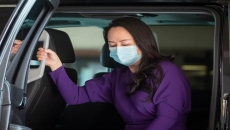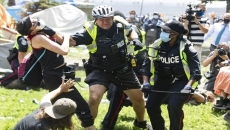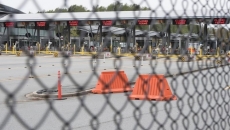A group of U.S. and Canadian business leaders is pushing Congress for a plan to ease restrictions at the land border with Canada.
The group, led by the North American Strategy for Competitiveness, wants senior congressional leaders to demand a detailed strategy from the Department of Homeland Security.
Specifically, the coalition is worried about what it calls "tremendous delays" as border agents struggle to process vaccination status and COVID-19 test results from inbound travellers.
Their letter to senior members of Congress calls on the department to explain how it plans to deal with an influx of visitors from Canada when the travel ban is finally eased.
"We understand the necessity of protecting public health and believe that the U.S. can do so while also easing the restrictions at the land border," the letter reads.
However, U.S. Customs and Border Protection "does not appear to have a plan in place to execute a safe reopening without causing tremendous delays at land ports of entry."
The letter is addressed to the chairs and ranking members of the Senate and House committees and subcommittees on homeland security, as well as members of several key Canada-U.S. caucus groups.
Its signatories include organizations focused on cross-border commerce and travel, including the Canada-U.S. Business Association, the Border Trade Alliance and the Pacific Northwest Economic Region.
Fully vaccinated U.S. citizens and permanent residents will be allowed to cross into Canada beginning Monday. The U.S., however — citing concerns about the Delta variant — has extended its own restrictions at land crossing points until Aug. 21.
And while he didn't specifically mention Canada, Jeff Zients, who oversees the White House COVID-19 response, suggested Thursday that the U.S. is not in any hurry to ease its current limits on inbound travel.
"Given where we are today … on the prevalence of the Delta variant, the United States will maintain the existing travel restrictions at this point," Zients told a media briefing.
Interagency working groups established by the White House to examine the issue of international travel are actively exploring how best to allow travel to resume when the time comes, he added — including whether to require proof of vaccination.
"Part of that planning is a phased approach that foreign nationals travelling to the United States may — there's still policy work being done here — may need to have some type of a vaccine requirement," Zients said.
"That's not a decision at this point; that's one of the paths that's being looked at and considered. But there are there are alternative paths being looked at at the same time."






